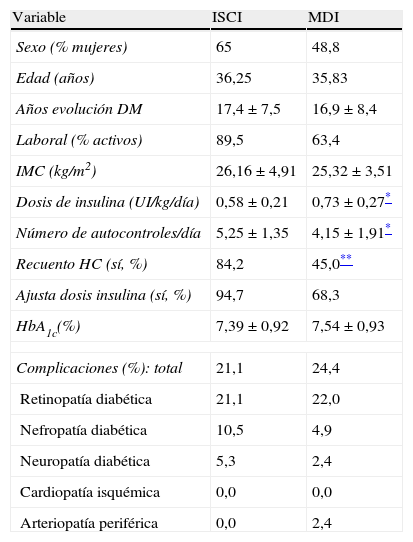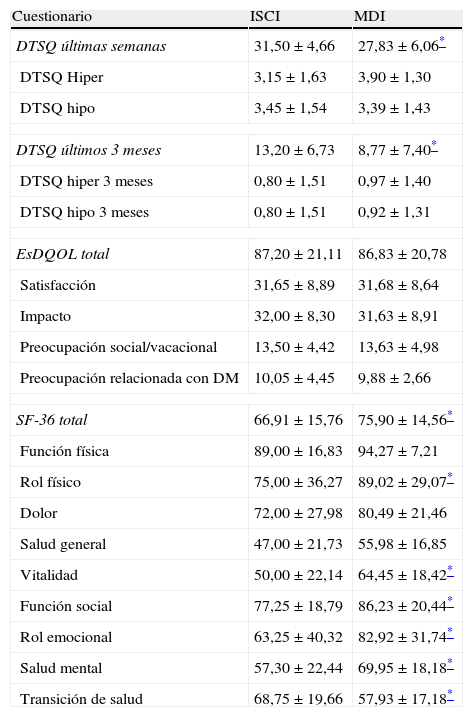Valorar la calidad de vida (CV) y satisfacción (SF) de los pacientes con diabetes mellitus tipo 1 (DM1) en terapia con infusión subcutánea continua de insulina (ISCI) comparado con los pacientes tratados con multidosis diarias de insulina (MDI).
MétodoEstudio descriptivo valorando la CV y SF de 68 pacientes en tratamiento con ISCI o MDI (1:2). Los instrumentos utilizados fueron la versión española del cuestionario de CV relacionado con diabetes (Diabetes Quality of Life [EsDQOL]) y el cuestionario general de CV SF-36, junto con el test de SF con el tratamiento recibido (Diabetes Treatment Satisfaction Questionnaire [DTSQ]).
ResultadosLos pacientes en terapia ISCI obtuvieron una puntuación similar a los tratados con MDI en el cuestionario EsDQOL (87,20±21,11 y 86,83±20,78, p=0,86, respectivamente), aunque mostraron resultados menores en el test SF-36 (66,91±15,76 y 75,90±14,56 p=0,03, respectivamente) salvo en el apartado transición de salud de este último, que resultó mayor (68,75±19,66 y 57,93±17,18 p=0,02, respectivamente). Los valores conseguidos en el cuestionario DTSQ fueron mayores en el grupo ISCI frente a MDI en las últimas semanas (31,50±4,66 y 27,83±6,06, p=0,01, respectivamente) y en los últimos 3 meses (13,20±6,73 y 8,77±7,40, p=0,01, respectivamente).
ConclusionesLos pacientes con DM1 en terapia ISCI mostraron peor CV general aunque se sienten más satisfechos con su tratamiento que los tratados con MDI. No detectamos diferencias en la CV relacionada con diabetes entre ambos grupos de tratamiento.
To assess the quality of life (QOL) and satisfaction (SF) in patients with type 1 diabetes mellitus (T1DM) treated with continuous subcutaneous insulin infusion (CSII) compared with multiple daily insulin injections (MDI).
MethodA descriptive study was conducted to assess the QOL and SF of 68 patients on CSII or MDI treatment (1:2). The instruments used were, the Spanish version of the Diabetes Quality of Life (EsDQOL) specific for diabetes related QOL, SF-36 for general QOL, and the Diabetes Treatment Satisfaction Questionnaire (DTSQ) for SF evaluation.
ResultsThe EsDQOL scores for patients on CSII therapy were similar to those treated with MDI (87.20±21.11 vs 86.83±20.7, P=.86), with lower scores in the SF-36 questionnaire (66.91±15.76 vs 75.90±14.56, P=.03) except in Health Transition section, where patients treated with CSII showed higher scores (68.75±19.66 vs 57.93±17.18, p=.02). The values obtained in the DTSQ questionnaire were higher in CSII patients compared with the MDI group in last weeks (31.50±4.66 vs 27.83±6.06, p=.01) and last three months periods (13.2±6.73 vs 8.77±7.40, p=.01).
ConclusionsPatients with T1DM on CSII therapy showed a poorer global QOL, although they felt more satisfied with their treatment than those treated with MDI. No differences in diabetes related QOL were detected between groups.
Artículo
Comprando el artículo el PDF del mismo podrá ser descargado
Precio 19,34 €
Comprar ahora








